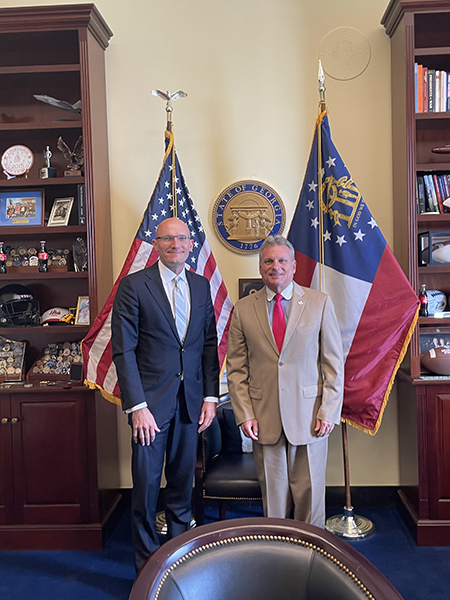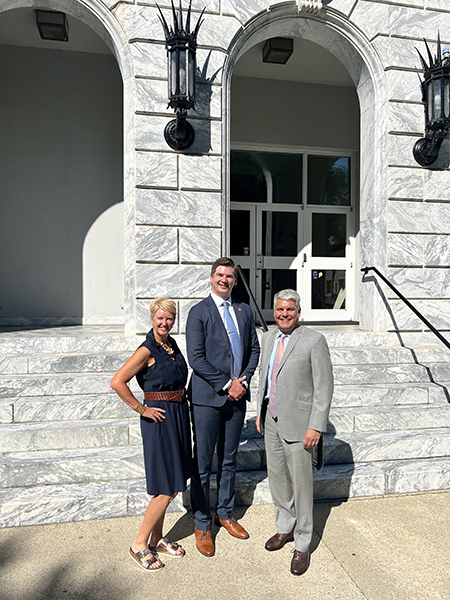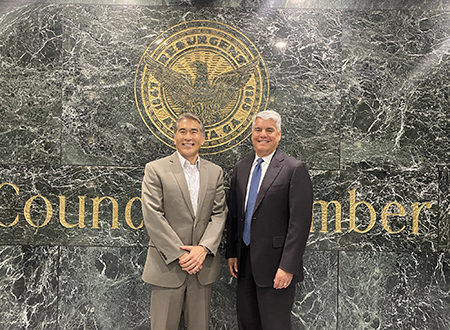Pictured above from left to right are Jenna Colvin (GICA), Tyler Eck and President Fenves.
Georgia Rare Disease Council Appointment
On July 16, Emory Healthcare was notified that Sarah Penna, LCSW, ACM-SW, Social Worker at the Emory ALS Clinic, was appointed by Lt. Governor Geoff Duncan to serve on the Georgia Rare Disease Advisory Council. House Bill 918, sponsored by Rep. Mike Cheokas (R – Americus), created the 16-member Georgia Rare Disease Advisory Council. The council will hold meetings, consider input from experts and key stakeholders and advise on the needs of those with rare diseases. HB 918 defines a rare disease as, “A rare disease, sometimes called an orphan disease, is defined as a disease that affects fewer than 200,000 people in the United States.”
State Study Committees (Workforce Commission & Senate Study Committee)
On July 20, the Georgia Healthcare Workforce Commission held its introductory meeting and outlined its goal to determine solutions to Georgia’s healthcare workforce shortage. On July 26, the Senate Study Committee on People with Intellectual and Developmental Disabilities Waiver Plan Access met for the first time. Co-chaired by Senator Sally Harrell and Senator John Albers, this Committee will look into the waitlist for Home and Community Based Services and other 1915(c) waiver programs as well as state contracts with Care Management Organizations. Emory’s state affairs team will continue to monitor these committees and offer assistance when applicable.
CHIPS
On July 27, the U.S. Senate passed the slimmed down Creating Helpful Incentives to Produce Semiconductors, or CHIPS, legislation with a bipartisan vote of 64-33. We expect the House to move on this quickly. President Biden has indicated his intention to sign the legislation into law. While this version is smaller than what we had hoped for, Emory is pleased that increased research funding made it into the final passage while potentially harmful provisions were omitted from the final package. The package, considered for almost two years, includes $52 billion initial funding for semiconductor manufacturing subsidies, tax credits for continued semiconductor production, and funding for research at the National Science Foundation and Department of Energy. For more information on the legislation, you may refer to this summary and its corresponding fact sheets. For a section-by-section look at the legislation, please click here.
FY2023 Appropriations
The U.S. House of Representatives has been working to move the federal FY23 appropriations bills. Last week, the House passed a “minibus” that includes funding for multiple federal agencies, including the FDA. We had hoped there would be a deal on the Labor, Health, and Human Services bill, but that has been pushed to September. Even if the House moves on all of its packages, the Senate is still far behind their counterparts. We do expect Congress to pass a Continuing Resolution (CR) by the September 30 deadline, but will continue to advocate for a full appropriations process that includes multiple Emory priorities.
Inflation Reduction Act
After months of negotiation, Majority Leader Chuck Schumer (D-NY) and Senator Joe Manchin (D-WV) have reached a deal on the reconciliation package, previously known as “Build Back Better.” This legislation makes investments in domestic energy production, reduces carbon emissions, and extends the Affordable Care Act subsidies. Part of the payfors includes allowing Medicare to negotiate the prices of certain prescription drugs. The federal team is closely watching this as they attempt to move the legislation through the Senate. For more information please click here.
Telehealth Package Advances on Capitol Hill
On July 27, by an overwhelming majority vote, a telehealth flexibility package passed the U. S. House. The bill allows Medicare, federally qualified health centers, and rural health clinics to continue covering telehealth visits from patients’ homes, as well as audio-only telehealth under Medicare. The measure would also extend a waiver permitting mental health patients to avoid in-person visits. This legislation extends the flexibilities through the end of 2024. Without this or similar legislation, telehealth flexibility will end five months post public health emergency expiration. The path in the Senate is unclear, but the OGCA team will continue to push for this to be included in an end of year package. | 







